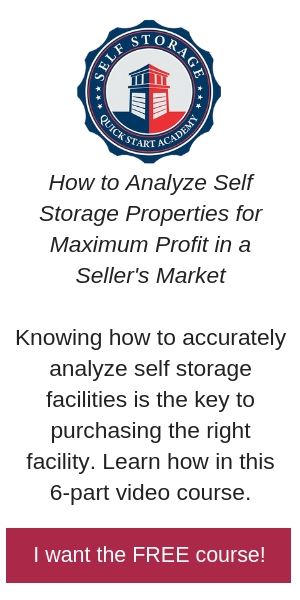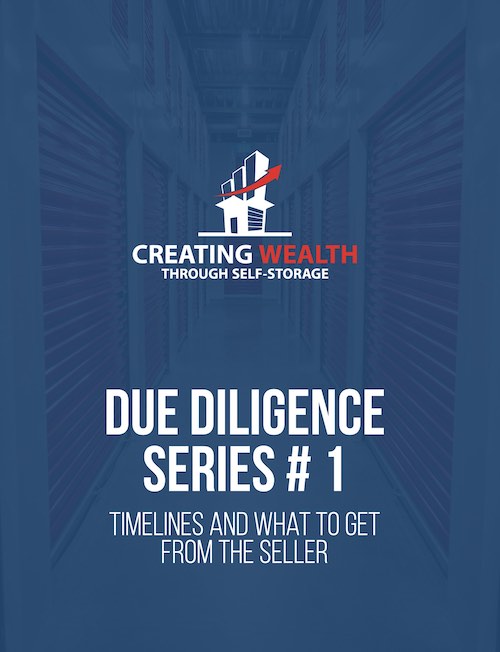So you’ve decided to invest in self storage.
You know the benefits of self storage over other types of real estate. If you need more information about those benefits, click HERE.
Now the decision is how and where to invest.
This is assuming that you don’t want to be involved in the ownership and day to day management of a self storage company. You do know this is a sector that is a good place to invest some of your money. But where exactly should you invest?
You have some options.
Some good options.
Let’s take a look.
Real Estate Investment Trusts (REITs) and How They Work
REITs are companies with a very specific structure that own real estate. They are usually sector specific such as self storage or retail. The majority of REITs, including all self storage REITs, own real estate. They either buy existing facilities or construct buildings on their land.
REITs take this real estate and find ways to generate operating income from them, usually by leasing out the property to tenants. The rent paid by tenants covers the expenses of operating and managing the properties. What’s left is profit for the REIT.
To qualify as a REIT, a company must be organized as a corporation and must have at least 100 shareholders. No five individuals can own more than 50% of any REIT’s shares. Like most corporations, REITs must have a Board of Directors or Trustees that manage the business.
One of the requirements of a REIT is to pay out most of their income to the shareholders. Shareholder dividends must make up 90% of their taxable income each year. If a company is not set up with to make these dividend payments they can’t be a REIT.
When you invest in a REIT, you are buying stock.
There are two ways to invest in a REIT. You can buy Index Funds – funds that own some stock in all or some of the five REITs in the self storage sector. (This is true of all sectors). Or you can invest in a specific REIT by buying stock in that company.
I am not a tax expert or a securities investment expert. You should always seek professional advice before making any type of investment. As a self storage owner/operator and someone who manages investor funds in this space, I’m speaking only from my understanding and experience.
Benefits of REIT Status
For the real-estate businesses that want to elect REIT status, the payoff is that REITs have the ability to avoid taxation at the corporate level.
Most corporate real-estate businesses have to pay corporate income tax on any net income they bring in. Any remaining after-tax profit is available to the business. They can reinvest this income in more property or return it to shareholders through dividends. But investors in non-REIT real-estate Corporate businesses end up essentially having their profits taxed twice: once at the corporate level and once when they pay any taxes due on the dividend income they receive.
REITs don’t have to pay taxes on their income. Instead, all of the tax attributes of the income and expenses the REIT receives and incurs get passed through to the individual shareholders of the REIT. They then bear the brunt of paying any necessary tax. Since the profits that fund the dividend distribution from the REIT haven’t been subject to tax, the REIT is able to pay a larger amount of income to its shareholders than a regular corporation.
REIT Performance
In the self storage space, most REITs, especially the publicly traded ones, are good operators. The industry has evolved over the past five years. The way the REITs make decisions and operate their facilities compared to the mom and pop facilities is vastly different.
Sophisticated data algorithm software allows these companies to make buying and operating decisions with up to the minute data metrics. This type of software is available to anyone but the majority of smaller operators in the self storage space have not started using this type of operational decision making yet. {link to episode 174 again here}
At the end of the day, in my opinion, investing in a publicly traded REIT is just like buying Apple stock or Vanguard index funds.
You own stock.
The private REITs design their own liquidly rules. For example, some may purchase back only 5% to 10% of their stock per year if you would want to liquidate. Otherwise, you would have to find a buyer on your own, and even then, there may be certain transfer rules and procedures.
Again, that is stock ownership.
The tax benefits of owning real estate as opposed to owning stock are vastly different, as we will discuss in this article.
Again seek help from your tax advisor, but REITs absorb most of the tax advantages real estate provides as an investment. What you receive in the form of stock dividends is taxable as investment income or capital gains (or losses).
The biggest benefit of investing in publicly traded REITs is that your investment is liquid because it is stock ownership.
If you invest directly in real estate your funds are usually not liquid. They are subject to the operating agreement of the ownership entity.
REIT performance has been good over the last few years.
The total combined return of the publicly traded REITs was 3.74% for 2017. But according to NarReit, it is 7.43% year to date for 2018 through July.
If you are considering investing in the self storage space through REITs, NarReit.com is a great source of data.
Private Placement Entities
Another option is to find operators and/or funds that specialize in self storage and invest with them.
Usually, you will own a certain percentage of the LLC or ownership entity that owns the facilities. From here I am speaking mostly from my experience as an owner and consultant who has helped other people set up their own self storage companies.
As a general rule, the LLC that owns the self storage will have at least two classes of ownership. The originators or sponsors put the company together, find the properties, and guarantee any debt that may be required for the facilities. They may also manage the facilities or hire third-party management.
Usually, there is bank debt or some kind of debt on the properties. We have to do this in our LLCs in order to hit the above-market returns required to attract investor capital. In our experience, we have to keep our cost of capital at 8% or less. If we are paying out 10-12% preferred returns we need a substantial amount of the debt to be 5% or less.
Investors usually invest in LLC’s that are set up as “Partnerships” for tax purposes. The profits or losses as passed through to investors on K-1’s in most cases.
This is one of the best benefits of this type of investment strategy.
What gets passed through is income that has been calculated after receiving all the benefits that real estate offers such as depreciation and operating expense write-offs.
In our operations, and we are not unique, we usually obtain a cost segregation report which is organized and executed by our CPAs. This is a report designed to accelerate the depreciation on certain building components of the project. For example, the light fixtures and the wires running to the light fixtures each have their own depreciation time period. Each of them is shorter than the 27.5 years for residential buildings and 39-year depreciation for commercial buildings allowed using straight-line depreciation (like self storage).
The IRS has said that if you follow their guidelines and have an engineered report generated, a new revised depreciation schedule is allowable that drastically increases the allowable depreciation write off in the first seven years or so.
The net effect is the ability to have much less of the profits be taxable.
Our investors benefit from this because their money is invested in the first years of the projects where the depreciation is the highest.
Again, I am not a tax expert. Always seek competent tax and legal advice for your situation and go by what they say, not me.
Usually, this type of LLC or fund offers above-market returns (i.e. above the average of the Dow or Nasdaq in any given year). They also often allow the investors to participate not only in the cash flow and tax benefits but also in the appreciation and their percentage of ownership of the sales profits upon disposition.
The downside is that usually funds are not liquid but tied up in the investment for a number of years. If you need access to your funds, there are usually very specific procedures to follow and the LLC documents dictate the procedure.
Analyze the document carefully and seek competent advice to see if this is the way for you to invest in self storage.
The profile of our typical investor is someone who invests a portion of their investment funds in our companies as a way to get above market returns in an asset class that is generally safer than most other types of investment real estate.
Some but not all of their funds.
As we have been able to develop a successful track record of performance, the “preferred returns” (returns paid out first) we have to offer have gone down some, but all are still above market returns. I don’t think we are any different from most operators of these types of investment vehicles.
As an investor, you should always vet the sponsors or organizers of the company. Seek out their track record and talk to past investors if there are any.
Look at their track record. If they are new to self storage that’s okay. They do need to have a successful investment track record in some type of investment real estate and adjust your investment return expectations accordingly.
Again, seek competent advice, and not from the person presenting the offering.
Conclusion
I am often asked by investors, ” How do I invest in self storage if I don’t want to run the facilities?”
With my limited experience, these are the two best ways I know of.
In the end, if the REIT or acquisition LLC you are choosing has people running it who know what hey are doing in self storage, you will most likely come out on top.
Publicly traded REITs offer liquidity for your investment. They are usually good operators. Those are their main benefit.
Private REITs are usually good operators, sometimes offer higher returns than publicly traded REITs, and each has their own liquidity rules. Usually, they are less liquid than a publicly traded REIT.
Private acquisition LLC’s or Private Placements in the self storage space usually offer higher returns and are riskier because the company is usually less capitalized. However, in most cases, the investor gets all the benefits of real estate ownership passed through to them. Almost every single LLC or Acquisition LLC I have seen gets taxed as a partnership.
It never ceases to amaze me the difference in how the IRS treats real estate. In many ways, it does not make sense to me, but I won’t complain. I have been receiving its benefits all my professional career.
I get a lot of personal satisfaction when I see profitable investment vehicles in the self storage space that passes these benefits through to the investors who took a chance. Self storage is the best real estate investment asset there is in my opinion, and to share that with someone who put money in the company along with the benefits of real estate ownership is fun and fulfilling.




Mark,
Great article!
In this excerpt you reference software with a link, but it appears the link doesn’t work. Can you link to the software you’re referencing?
“Sophisticated data algorithm software allows these companies to make buying and operating decisions with up to the minute data metrics. This type of software is available to anyone but the majority of smaller operators in the self storage space have not started using this type of operational decision making yet. {link to episode 174 again here}”
Thanks
Thanks for letting me know. What I was referring to here is that if you are interested in getting a preliminary analysis for a project, to get a glimpse at supply demand and per capata square footage of self storage, contact me with the address. I will let you know if I have data for that address. Click Here: http://creatingwealththroughselfstorage.com/contact/
The operational software we use is Veritec. This allows us to glimpse into the submarkets ongoingly and see our pricing related to the market and the offers other facilities are offering the public. click here: http://www.veritecsolutions.com/